- The Woman Question in France, 1400-1870
- Debating the Woman Question in the French Third Republic, 1870-1920
- Feminismos europeos, 1700-1950 Una historia politica
- Europski Feminizmi 1700-1950
- Les Féminismes en Europe
- Globalizing Feminisims
- European Feminisims
- Paul De Cassagnac
- Writing Woman's History
- Women and Family Freedom
- Victorian Woman
The Woman Question in France, 1400-1870
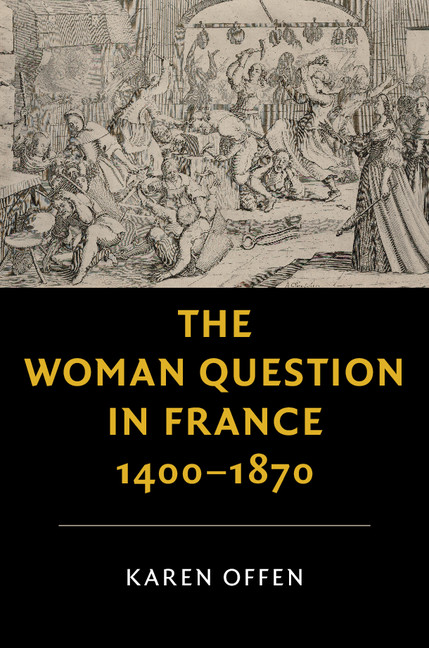 The Woman Question in France, 1400-1870.
The Woman Question in France, 1400-1870.
From the General Introduction:
‘The very eruption of a “woman question,” as the controversy over the relations of the sexes in society was long called in France, can be read as evidence of a serious sociopolitical problem, of contestation over what I am calling the “sexual balance of power.” Studies of the balance of power, as posed by earlier generations of historians, envisaged only international or intranational struggles by male elites for political dominance; even as they expanded to consider class conflict, they took for granted (and said nothing about) the sexual imbalance of power within the societies they were discussing.
‘Women's history has changed all this, not only by excavating and highlighting women's lived experiences but also by confronting historians with the centrality of the politics of gender as a subject worthy of historical scrutiny. Once one has begun to consider the past by examining its gender politics, it is impossible to revert to more conventional ways of viewing it.’
From the Publisher’s Introduction:
‘This is a revolutionary reinterpretation of the French past from the early fifteenth century to the establishment of the Third Republic, focused on public challenges and defenses of masculine hierarchy in relations between women and men. Karen Offen surveys heated exchanges around women’s “influence”; their exclusion from “authority”; the increasing prominence of biomediccal thinking and population issues; concerns about education, intellect, and the sexual politics of knowledge; and the politics of women’s work. Initially, the majority of commentators were literate and influential men. However, as more and more women attained literacy, they too began to analyze their situation in print and to contest men’s claims about who women were and should be and what they should be restrained from doing, and why. As urban print culture exploded and revolutionary ideas of “equality” fuelled women’s claims for emancipation, this question resonated throughout francophone Europe and, ultimately, across the seas.’
Advance Praise for The Woman Question in France, 1400-1870:
A monumental work of historical scholarship. In every chapter, Offen demonstrates the wide variety of women’s voices, the importance of their intellectual contributions, and the persistence with which women leaders agitated for change. With admirable, lucid prose, she shows that when individuals analyzed the nature and meaning of 'woman', they were also talking about other crucial things - from power and authority to biology and religion. This book makes an exceptionally important contribution to the history of women, gender, and women’s emancipation (including the obstacles to it), while reorienting our understanding of French history itself.' Edward Berenson, New York University
Debating the Woman Question in the French Third Republic, 1870-1920
 The Woman Question in France, 1400-1870.
The Woman Question in France, 1400-1870.
From the Publisher's Introduction:
‘Karen Offen offers a magisterial reconstruction and analysis of the debates around relations between women and men, how they are constructed, and how they should be organized, that raged in France and its French-speaking neighbors from 1870 to 1920. The 'woman question' encompassed subjects from maternity and childbirth, and the upbringing and education of girls to marriage practices and property law, the organization of households, the distribution of work inside and outside the household, intimate sexual relations, religious beliefs and moral concerns, government-sanctioned prostitution, economic and political citizenship, and the politics of population growth. The book shows how the expansion of economic opportunities for women and the drop in the birth rate further exacerbated the debates over their status, roles, and possibilities. With the onset of the First World War, these debates were temporarily placed on hold, but they would be revived by 1916 and gain momentum during France's post-war recovery.’
Advance Praise for Debating the Woman Question in the French Third Republic, 1870-1920:
'No one has done more over the past forty years to establish women’s history in the scholarship of the French Third Republic than Karen Offen. Now, in Debating the Woman Question, we have her chef d’oeuvre. It was worth the wait: a deeply thought-out analysis of many sides of the 'woman question' from maternity through education to religion and economics. It is a must-read for anyone interested in modern France.'
This is a brilliant reconstruction and analysis of eight decades of heated quarrels in which feminists, female as well as male, talked back to anti-feminists, contesting male authority, in France as well as in other francophone and neighboring countries. A fascinating wealth of sources, many of them unknown heretofore, inform and contextualize the analysis which leads up to Simone de Beauvoir's The Second Sex and will certainly arouse important scholarly debates.' Gisela Bock, Freie Universität Berlin
The work of a celebrated pioneer in the history of women, Karen Offen's much anticipated history of the woman question in France, is a deeply researched, erudite study of the multifaceted debates that engaged women and men across the political spectrum during the first fifty years of the Third Republic. A variety of topics emerged: the intelligence, nature, duties, rights, and other characteristics of women that qualified them for or disqualified them from full citizenship and public responsibility. The rich debate plus the engaging cast of characters should finally discredit the cliche that French women thinkers and activists were less evolved than feminist activists elsewhere. Given the widening interest in feminism today, Offen's incomparable scholarship is a foundational resource.' Bonnie G. Smith, Rutgers University, New Jersey
Feminismos europeos, 1700-1950 Una historia politica
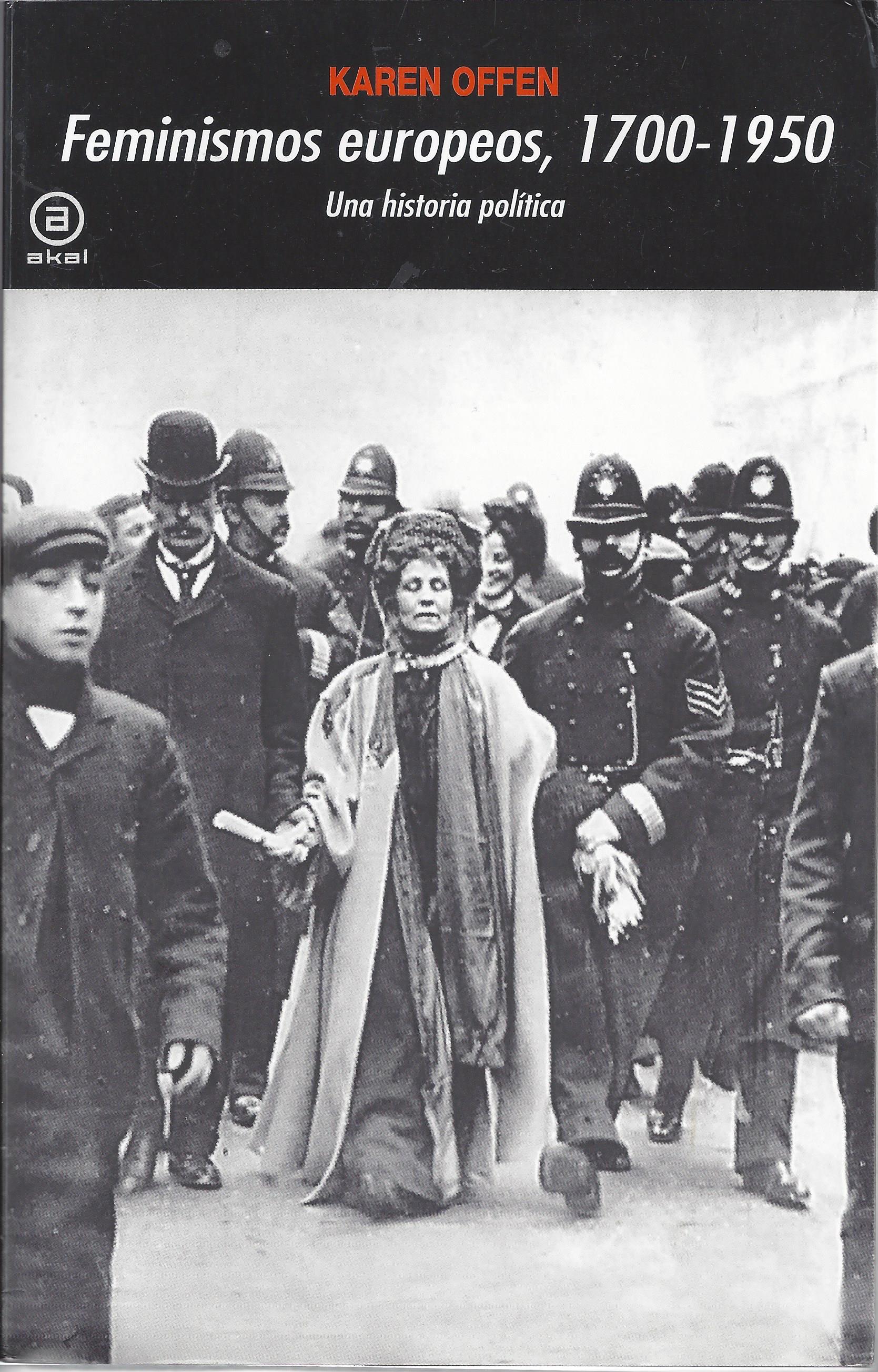 Feminismos europeos, 1700-1950 Una historia politica.
Feminismos europeos, 1700-1950 Una historia politica.
This is the Spanish translation of European Feminisms. To date no reviews have come to the attention the author.
Europski Feminizmi 1700-1950
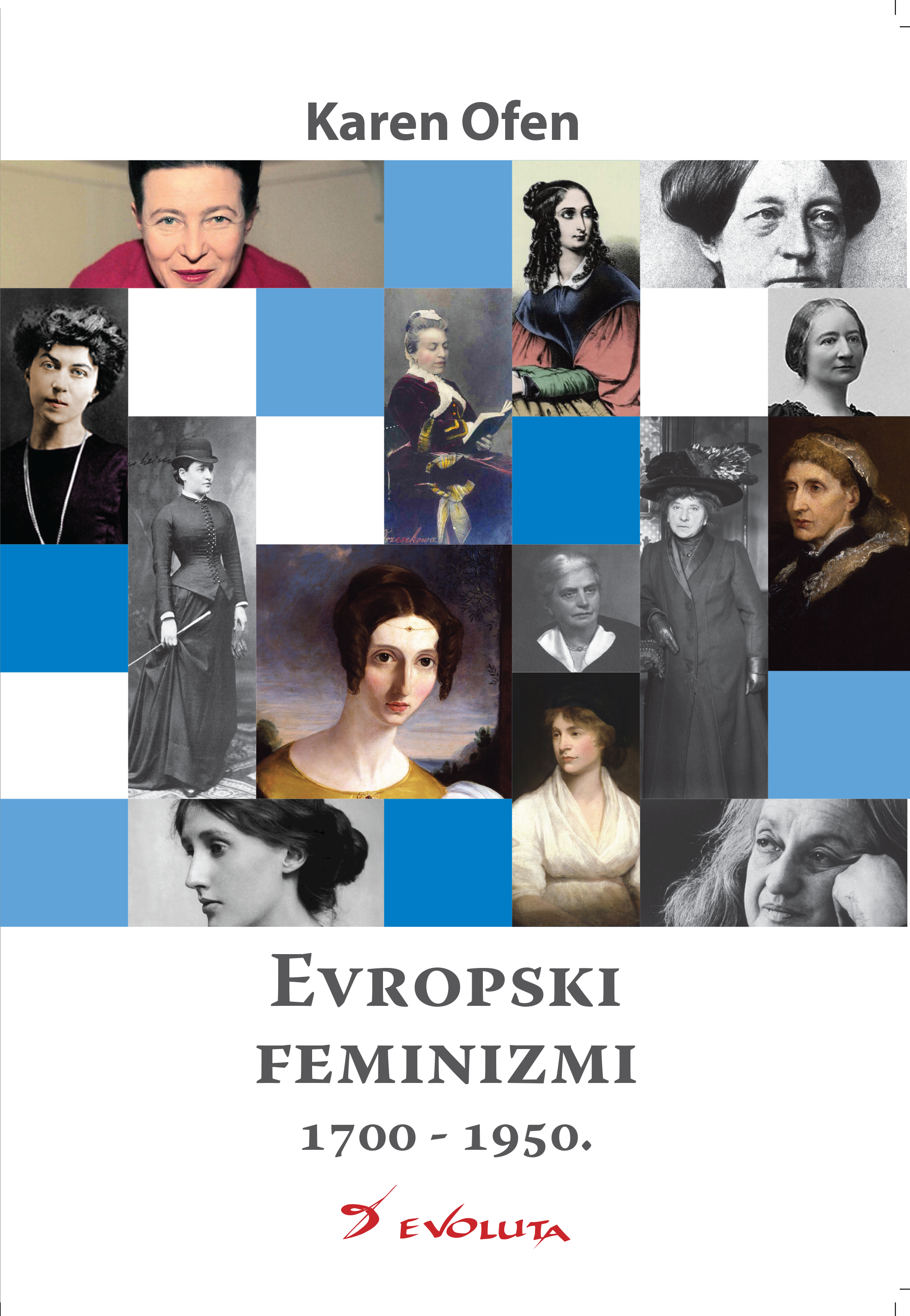 Europski Feminizmi 1700-1950.
Europski Feminizmi 1700-1950.
This is the Serbian translation of European Feminisms. To date no reviews have come to the attention the author.
Les Féminismes en Europe
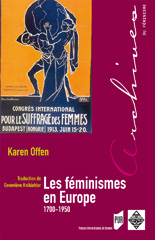 Les Féminismes en Europe, 1700-1950. Traduction de Geneviève Knibiehler. Presses Universitaires de Rennes, 2012.
Les Féminismes en Europe, 1700-1950. Traduction de Geneviève Knibiehler. Presses Universitaires de Rennes, 2012.
Globalizing Feminisms
Globalizing Feminisms, 1789–1945
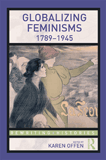 My objective in editing this collection is to provide a comprehensive, thought-provoking, and teachable collection of pathbreaking articles on the comparative history of feminisms around the world prior to 1945. The volume showcases important second- and third-generation findings, emphases, or reinterpretations that rewrite history in significant ways. These articles place the thought and action of feminists at the center of historical analysis. They deepen our knowledge through comparison and contrast. Globalizing Feminisms before 1945 provides a companion volume to Routledge’s Global Feminism after 1945, edited by Bonnie G. Smith, in the series Rewriting History, edited by Jack Censer.
My objective in editing this collection is to provide a comprehensive, thought-provoking, and teachable collection of pathbreaking articles on the comparative history of feminisms around the world prior to 1945. The volume showcases important second- and third-generation findings, emphases, or reinterpretations that rewrite history in significant ways. These articles place the thought and action of feminists at the center of historical analysis. They deepen our knowledge through comparison and contrast. Globalizing Feminisms before 1945 provides a companion volume to Routledge’s Global Feminism after 1945, edited by Bonnie G. Smith, in the series Rewriting History, edited by Jack Censer.
The history of feminisms is, in fact, women’s political history. Women’s pursuit of citizenship in emerging nations provides the unifying theme for the volume. Although women’s suffrage campaigns figure prominently in this collection, it bears repeating that for feminist women, obtaining the vote–and thus decision-making power– within their countries was never the ultimate objective; in democratizing societies, feminists viewed suffrage as the most efficient means for women to realize a multitude of other dramatic, even revolutionary changes in prevailing laws, institutions, ideas, and practices–and promoting equal opportunity in education, law, the workplace and social services. To them, the vote provided a tool for reframing the connections between, and showing the connections among fields as varied as economics, sexuality, war, and peace. For feminists of either sex (and it bears emphasizing that male feminists existed throughout this period in most countries, though the majority were undoubtedly women), theory and practice were intimately intertwined. Their common goal was to that restore a balance of power between the sexes–a balance lacking in male-dominated societies. In fact, they represented a very small cluster of activists operating in hostile environments. Thus, to tell their stories, discourse analysis is not enough; we need to analyze their actions as well, and place both their arguments and campaigns carefully within their immediate historical context–in nearly every case studied here, the rise of sovereign nation-states–that most powerful form of “imagined community.”
Contributors Include:
Padma Anagol, Marilyn J. Boxer, Jacqueline R. DeVries, Ellen Carol DuBois, Louise Edwards,
Ellen L Fleischmann, Rochelle Goldberg Ruthchild, Patricia Grimshaw, Inger Hammar, Nancy Hewitt, Francesca Miller, Barbara Molony, Karen Offen, Florence Rochefort, Leila J. Rupp, Sandra Stanley Holton, Anne Summers, Ann Taylor Allen, Angela Woollacott and Susan Zimmermann.
European Feminisms
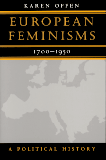 European Feminisms, 1700-1950: A Political History. Stanford University Press, 2000.
European Feminisms, 1700-1950: A Political History. Stanford University Press, 2000.
From the Enlightenment to the Atomic Age, Karen Offen takes the reader on a voyage of discovery to rescue the amazing story of European women’s (and men’s) campaigns against male domination and to restore its memory to today’s women and men.
European Feminisms was selected by a Portuguese women’s organization as one of 101 important books by women written in the 20th century. The exhibition of selected books, Mulheres Sécolo XX: 101 Livros, opened on 15 November 2001 at the Palace of Discoveries. It was organized by Maria Antonia Fiadeiro and sponsored by the Department of Culture of the Municipal Government of Lisbon, under the patronage of the President of the Council of Ministers and the Portuguese Ministry of Culture.
Other writers honored in the exhibition, and the accompanying catalog and poster, include Virginia Woolf, Isabel Allende, Anais Nin, Marie Curie, Simone de Beauvoir, Gisela Bock, Luce Irigaray, and Toni Morrison.
Praise for European Feminisms
“In an ambitious history, detailed in both depth and breadth, Offen provides a comprehensive account that re-reads European history from developing feminist perspectives . . . . affordable and interesting enough to appeal to the general reader. . .
—Feminist Academic Press Column, www.litwomen.org/facp/julyo1.html
“The real strength of the book is its comparative work, both in describing the activity of feminist organizations and in debating the differences in theory and practice engendered by different national and regional contexts. . . . Offen does not merely pay lip service to the idea of comparative history, she does it.”
- Douglas Cremer, H-NET Book Review (May 2001), www.h-net.org/reviews
“[Offen’s] crowded chronicle offers a rich account of the aspirations, illusions, disillusions, flounderings, achievements, and advances of a compelling cause.” - Eugen Weber, The Key Reporter (Phi Beta Kappa)
“an extraordinary synthesis. . . its lucid style also makes it suitable for advanced undergraduates.”
- Marybeth Carlson, History: Reviews of New Books
“. . . a beautifully composed, intellectually rigorous re-examination and revaluation of the European past . . . provocative and intellectually engaging. Students in my undergraduate “Women in Modern Europe” class thoroughly enjoyed the text, voting it their favorite of the five books assigned for the course.”
- Carolyn Eichner, University of South Florida
“. . . a truly pathbreaking work. . .rich and informative. . .”
- Ann Taylor Allen, University of Louisville www.amazon.com
“European Feminisms provides the best-documented (more than one-third of its six hundred pages is notes) and most synthetic survey of the European-wide effort to date.”
- Bonnie G. Smith
Journal of Women’s History
“. . . an ambitious and substantially fascinating comparative narrative . . . thoroughly researched, bibliographically impeccable, and interpretatively feisty. . . henceforth essential reading for experts and generalists alike. . . At the political and economic birth of the new European Union, it is timely for the continent to remember its feminist pasts.”
-Judith A. Allen
American Historical Review
“This book is ‘a must’ for every scholar in women’s/gender studies, for present-day women’s activists and political leaders throughout Europe and the world; it is ‘a must’ for both scholars in the humanities and in the sciences, for every personal and public library collection.”
- Krassimira Daskalova
Divinatio: Studia Cultorologica (Bulgaria)
“Karen Offen’s encyclopedic compendium of European feminisms deserves to be on the bookshelf of all historians interested in feminism, in women’s rights, and in European political and intellectual history. . . this book is a tour de force; there is none that compares.”
- Rachel G. Fuchs
Journal of Modern History
Paul de Cassagnac and the Authoritarian Tradition in Nineteenth Century France
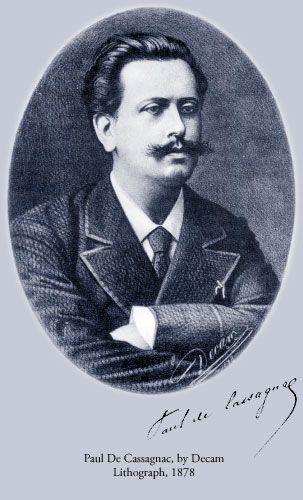 Paul de Cassagnac and the Authoritarian Tradition in Nineteenth‑Century France.
Paul de Cassagnac and the Authoritarian Tradition in Nineteenth‑Century France.
Garland Press, 1991
The life and times of a feisty and notorious Catholic monarchist journalist, legislator, lover, and swords-man who forged a political career in opposition to the French Third Republic.
Writing Women’s History: International Perspectives
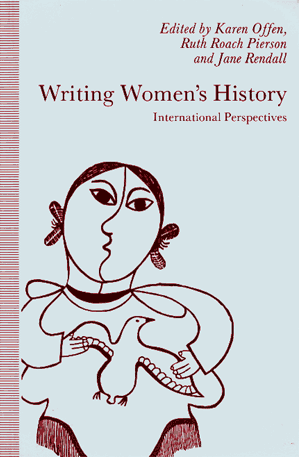 Writing Women's History: International Perspectives, co-edited with Ruth Roach Pierson and Jane Rendall, on behalf of the International Federation for Research in Women's History. Macmillan Press, London, and Indiana University Press, 1991.
Writing Women's History: International Perspectives, co-edited with Ruth Roach Pierson and Jane Rendall, on behalf of the International Federation for Research in Women's History. Macmillan Press, London, and Indiana University Press, 1991.
The first-ever survey of the development of women’s history in twenty-two countries on five continents.
Women, the Family, and Freedom: The Debate in Documents, 1750–1950
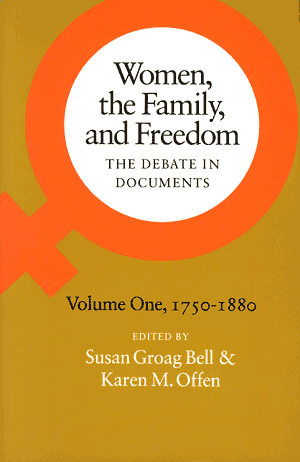 Women, the Family, and Freedom: The Debate in Documents, 1750-1950, co-edited with Susan Groag Bell. 2 volumes. Stanford University Press, 1983.
Women, the Family, and Freedom: The Debate in Documents, 1750-1950, co-edited with Susan Groag Bell. 2 volumes. Stanford University Press, 1983.
Reconstitutes and interprets the debate on the “woman question” in Western societies (Europe and in the United States) through contemporary documents.
Victorian Women: A Documentary Account of Women’s Lives in Nineteenth Century England, France, and the United States
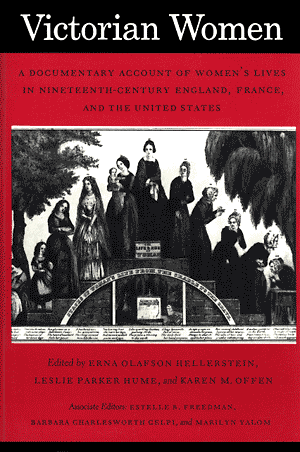
Victorian Women: A Documentary Account of Women's Lives in Nineteenth Century England, France, and the United States, co-edited with Erna Hellerstein and Leslie Hume. Stanford University Press, 1981.
A voyage into the variety and intricacies of women’s lives in three countries during the 19th century, with first-person documents, advice, laws, etc.